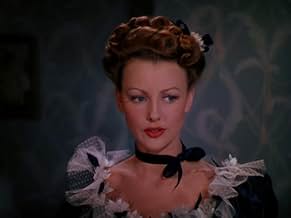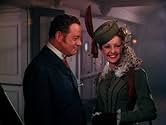Madeleine Marlowe, engaged to the Duke of Trippingham, discovers she's exposed as Rosie O'Grady by Police Gazette hack Samuel A. McGee, leading to an Irish brawl in her stage show.Madeleine Marlowe, engaged to the Duke of Trippingham, discovers she's exposed as Rosie O'Grady by Police Gazette hack Samuel A. McGee, leading to an Irish brawl in her stage show.Madeleine Marlowe, engaged to the Duke of Trippingham, discovers she's exposed as Rosie O'Grady by Police Gazette hack Samuel A. McGee, leading to an Irish brawl in her stage show.
- Awards
- 1 win total
Charles Trowbridge
- Husband
- (scenes deleted)
Bea Allen
- Chorus Girl
- (uncredited)
Louise Allen
- Chorus Girl
- (uncredited)
Herbert Ashley
- Minor Role
- (uncredited)
Hooper Atchley
- Salesman
- (uncredited)
Walter Baldwin
- Mailman
- (uncredited)
Featured reviews
A Music Hall star, Madeleine Marlowe (Betty Grable) returns from London to America where she has wowed society and is romantically linked with a Duke, Charles (Reginald Gardiner). On her return, a reporter Sam (Robert Young) exposes her as a former Burlesque Queen, Rosie O'Grady. The film then follows the tricks that Rosie and Sam play against one another in order to get the upper hand. At the end, love is in the air.
Unfortunately, the songs and dances in this film aren't any good and this lets the film down as the story doesn't have the strength to carry the film alone. The scenes with Betty Grable are good, but when she is not on screen, there are some pretty dull moments. Its not that the cast are bad, although there is a poor scene where Sam and Charles get drunk which could have been edited out, its just that the overall film isn't quite good enough. The music needed to be better in order to make this film passable or even good. Its a better story than her other offering "Coney Island" from the same year, but that film is better because of the music numbers that it contains.
Its OK but it doesn't need to be seen again.
Unfortunately, the songs and dances in this film aren't any good and this lets the film down as the story doesn't have the strength to carry the film alone. The scenes with Betty Grable are good, but when she is not on screen, there are some pretty dull moments. Its not that the cast are bad, although there is a poor scene where Sam and Charles get drunk which could have been edited out, its just that the overall film isn't quite good enough. The music needed to be better in order to make this film passable or even good. Its a better story than her other offering "Coney Island" from the same year, but that film is better because of the music numbers that it contains.
Its OK but it doesn't need to be seen again.
Robert Young is perfectly cast as a wise-guy reporter writing for a pre-Enquirer rag called the Police Gazette who is assigned by his crusty Editor, played perfectly by Adolph Menjou (Walter Burns from the original Front Page), to write a series of expose-type articles on returning stage star Betty Grable's burlesque beginnings. The Technicolor is luscious throughout. Reginald Gardiner is a stitch, as usual, playing Betty's British betrothed who breaks off the engagement as a result of the scandal. Virginia Grey is perky and decorative as Grable's maid. Byron Folger also lends support as a perfectly prissy prig (what else?).
Betty, of course, is the star. She sings and dances with aplomb. The added delight is her comic timing and chemistry with Young. We enjoy and believe them at each others throats which makes the inevitable payoff in each others arms that much more enjoyable.
Betty, of course, is the star. She sings and dances with aplomb. The added delight is her comic timing and chemistry with Young. We enjoy and believe them at each others throats which makes the inevitable payoff in each others arms that much more enjoyable.
Newspaper reporter makes a name for himself by scandalizing in print a beloved showgirl, known abroad as "The Yankee Sensation". She counteracts by telling his rivals it's all a publicity stunt and that she and the reporter are actually in love. Musical remake by 20th Century-Fox of their 1937 hit "Love is News", which starred Loretta Young; this version, filmed in gloppy Technicolor, is just an excuse to show-off their latest find, Betty Grable, who has presence but no funny lines (and a dearth of memorable songs). As the reporter, Robert Young doesn't even have presence. Fox tried again with this story in 1948 under the title "That Wonderful Urge", starring Gene Tierney. Strictly for Grable-buffs. ** from ****
...."Sweet Rosie O'Grady" and "Mother Wore Tights" were Betty Grable's favorites of her films. It is easy to see why they are. "Sweet Rosie" is just possibly Betty at her peak. To give credit where credit is due, Betty's peak lasted a remarkably long time. In this Betty is an established star in England returning to the United States. Robert Young is a newspaper reporter who dredges up her less than glamorous beginnings as a singer in a beer garden. They then proceed to scrap and humiliate each other right through the whole film. Reginald Gardnier is the guy who loses Betty. He must have liked Betty a whole lot. He lost her in a total of six films. Certainly no one could call him a quitter. He does get Betty's maid as a sort of consolation prize. Betty and Robert Young do finally resolve their differences and admit they like each other a lot. The whole thing is brisk and colorful--and like all Betty Grable films: a lot of fun.
SWEET ROSIE O'GRADY is typical of the Fox musicals Betty Grable made during her long reign as Queen of the Technicolor musicals, zooming to popularity at the box office during the '40s. Robert Young is the writer at the Police Gazette who churns up stories on her past as a burlesque queen, much to her dismay. She's the fiancé of a stuffed shirt (Reginald Gardiner) and for awhile Young is the cause of a rift in all three relationships.
Forget the paper-thin plot, the kind that Fox used all the time to display Grable in pretty costumes, given the chance to warble a few undistinguished song-and-dance routines in pleasant style.
With a supporting cast that includes Adolphe Menjou, Sig Ruman and Virginia Grey, it passes the time pleasantly but is the sort of film that is quickly forgotten after seeing it once.
Grable fans will appreciate the warmth and humor she brings to a basically one-dimensional role as a showgirl.
Forget the paper-thin plot, the kind that Fox used all the time to display Grable in pretty costumes, given the chance to warble a few undistinguished song-and-dance routines in pleasant style.
With a supporting cast that includes Adolphe Menjou, Sig Ruman and Virginia Grey, it passes the time pleasantly but is the sort of film that is quickly forgotten after seeing it once.
Grable fans will appreciate the warmth and humor she brings to a basically one-dimensional role as a showgirl.
Did you know
- TriviaA slightly reworked version of Love Is News (1937), a screwball comedy made during the 1930s starring Tyrone Power and Loretta Young.
- ConnectionsReferenced in We'll Meet Again: One Step Forward, Two Steps Back (1982)
Details
- Release date
- Country of origin
- Language
- Also known as
- En fästman för mycket
- Filming locations
- Production company
- See more company credits at IMDbPro
Box office
- Budget
- $1,185,000 (estimated)
- Runtime
- 1h 14m(74 min)
- Aspect ratio
- 1.37 : 1
Contribute to this page
Suggest an edit or add missing content




































